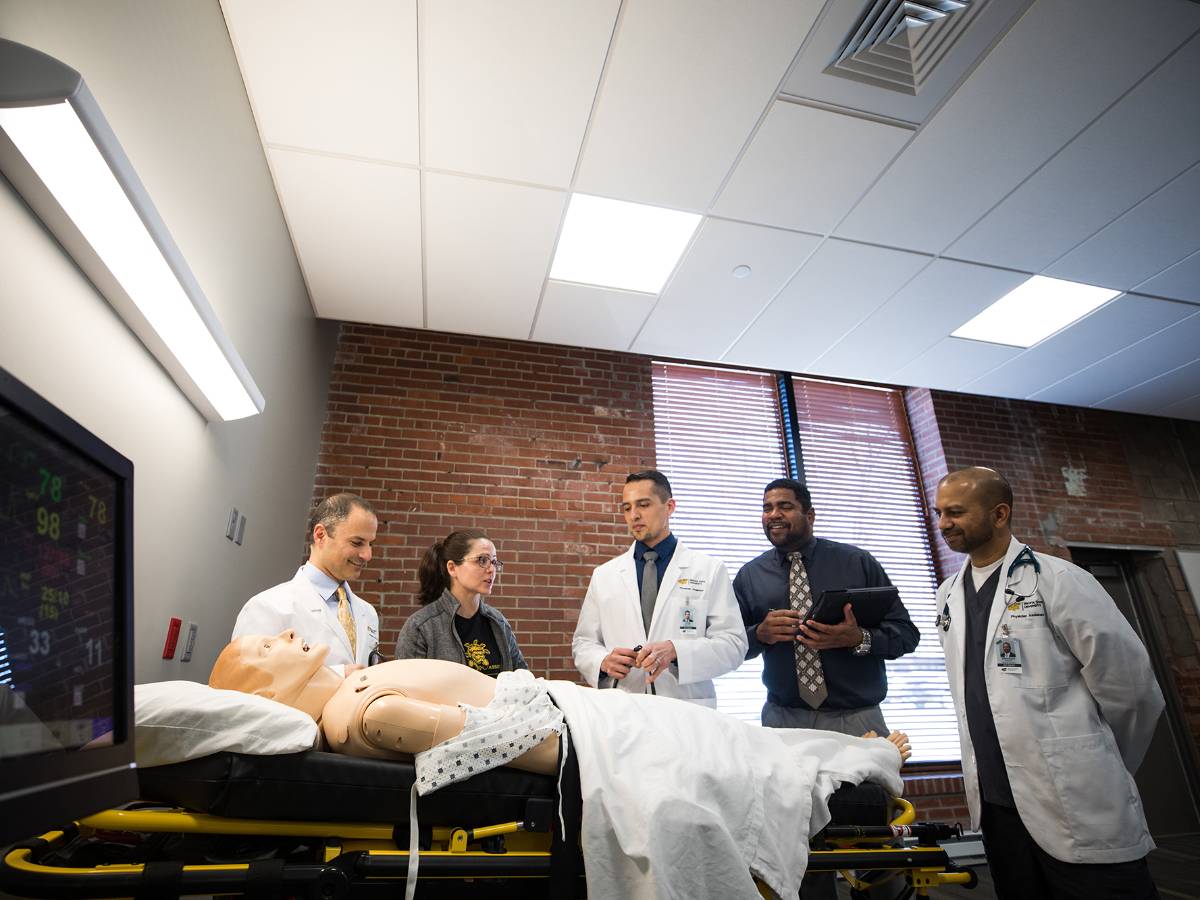The operating room is a shared space with high stakes and a need for precision, communication and cooperation.
It helps to practice with gloves and gowns on. Over and over again, if necessary.
At WSU Old Town, physician assistant students from Wichita State work and study in the building with WSU Tech students. The co-location of institutions creates opportunities for faculty and students to share experiences, lessons and equipment.
Wichita State's P.A. students learned how to navigate the operating room during gloving and gowning instruction from WSU Tech's surgical technician students. Their top responsibility is to keep the O.R. sterile.
“It was nice to be taught by them because you learn what their concerns are for the O.R. and what they're in charge of and how we fit into that,” Wichita State second-year physician assistant student Anna Robinson said. “They really know all of the rules and regulations.”
Keep your hands in proper position, away from the face and above the waist. Pass people back to back. Don't touch non-sterile items.
“They're very protective of their surgical field and we're going to be working with surgical techs when we're on rotations,” Wichita State second-year physician assistant student Jessica Butler said. “It makes them nervous having students - that don't really know what we're doing, exactly, yet – in there. It was nice to hear those concerns from them and get a better idea what the actual surgical techs in the actual O.R.'s are going to be thinking.”
That applied learning experience is a part of each of the Wichita State and WSU Tech shared spaces. At WSU South, WSU Tech students use a Wichita State lab for video editing. At the main campus National Center for Aviation Training, Wichita State students research composite materials and collaborate with WSU Tech students who do the fabrication and repair work.
“It proves that opportunity where theory and applied learning and a laboratory environment all collide into the absolute best learning environment ever,” said WSU Tech president Sheree Utash. “I call it disruptive education at its finest.”
Wichita State and WSU Tech students share break rooms, common areas and, at Old Town, lockers are mixed between the two student bodies. The intermingling is an effort to collide ideas and experiences with students and faculty. Saavedra said WSU Tech faculty spent two hours with him, outside of class, on advanced suturing techniques.
“We do share a space in real world,” WSU Tech program director Logan Threet said. “We want a physician assistant to be able to walk in a room and have a comfortable conversation with a (surgical technician). Starting that conversation on the front end here, I think, is a huge benefit."
Working together on exercises such as gowning and gloving offer P.A. students more time to repeat and train as necessary.
“It took what we were already doing outside, brought it in house, and stepped it up tremendously,” Wichita State program director Kim Darden said.
On Aug. 2, Wichita State's physician assistant students participated in a women's healthcare session with a birthing simulation. Before the two institutions affiliated officially on July 1, that clinical type of lesson wasn't available for all Wichita State P.A. students.
“It's a hand's on opportunity,” Wichita State associate professor Gina Brown said. “The students need to assess the urgency. They're going to do the initial assessment using different props that WSU Tech has. Then, they're moving into another room where there's a mannequin and that actually deliver a baby. They'll watch the monitor to make sure the mother's vitals and the baby's vitals are managing that delivery without any concerns.”
Wichita State's physician assistant program will use simulations in many scenarios, simulations created and managed by WSU Tech's Healthcare Simulation Technology students. On one side of the one-way glass, Wichita State students are presented by a mannequin's conditions. On the other side, simulation students and faculty observe their response.
“Their (WSU Tech) capstone project will be setting up simulation experiences for our P.A. students on their final evaluations,” Darden said. “For us, it helps with some of our accreditation requirements, because we have to be able to effectively assess that our students are meeting their learning outcomes. It takes a lot of time to come up with those (simulation) ideas and create them and implement them. Now, we're going to be able to join forces.”
At all the Wichita State-WSU Tech locations, Utash sees the mixing of student bodies as inspirational. The Wichita State graduate and under-graduate students can provide a road map for WSU Tech's younger students who may want to continue their education past a two-year degree. The Shocker Pathway program helps WSU Tech students earn an Associate of Arts degree from Wichita State.
“A lot of our students come into our programs and they are just beginning their educational journey,” Utash said. “It opens their eyes to how they can continue their educational journey, how they can go into the world of work and then remember the experiences they had in that shared learning environment.”


 Wichita State University
Wichita State University